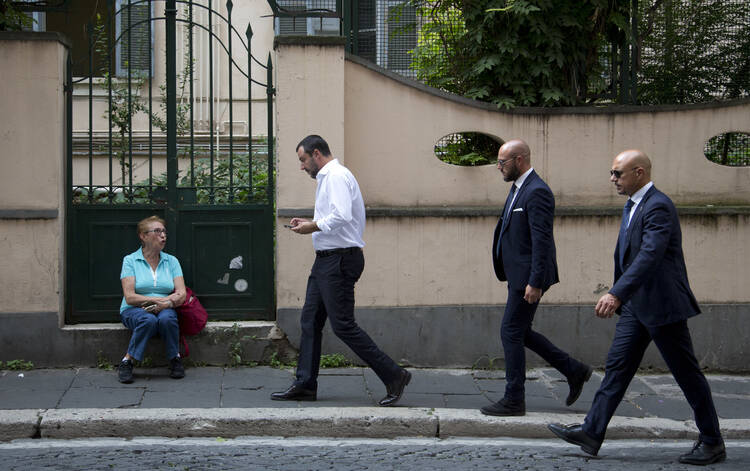ROME (AP) — Italy on Monday tightened criteria for migrants receiving humanitarian protection as its populist government deepened its crackdown on those seeking asylum.
A new law, in the form of a government decree approved by Premier Giuseppe Conte and his Cabinet, also permits authorities to suspend evaluation of asylum requests for migrants judged "socially dangerous" or are convicted of a crime, before court appeals are exhausted.
"We're not harming any fundamental right," asserted Interior Minister Matteo Salvini, who is driving the crackdown. "If you come into my home and deal drugs, I'll escort you back to where you came from," he told a news conference to unveil the decree.
His right-wing League party, whose popularity has been soaring in recent opinion polls, associates migrants with crime.
Humanitarian protection will now only be granted for victims of labor exploitation, human trafficking, domestic violence, natural calamities or those needing medical care as well as to those who performed "deeds of particular civic value," Salvini said, with the latter criterion an apparent reference to heroism.
The premier, who sympathizes with the euroskeptic 5-Star Movement, the government's main partner, indicated that Italian authorities had been too elastic in granting humanitarian protection.
"We will continue to assure there is the system of protection, we're just avoiding abuses," said Conte, adding that Italy had been showing "indiscriminate welcome" to asylum hopefuls.
Salvini said roughly a third of those who apply for asylum either receive it or some other special status, notably humanitarian protection. The remaining are eventually issued expulsion orders, but many of them slip away, often to find relatives in Northern Europe.
A large percentage of the rescued migrants are fleeing poverty and aren't eligible for asylum.
Through last year, about 600,000 migrants, most of them seeking asylum, landed in Italian ports after they were rescued at sea from boats launched from Libya by human traffickers.
But since Salvini has started denying port entry to private rescue boats, the numbers of arrivals in the last few months have plummeted. The heaviest-plied sea route now for migrant smuggling has shifted to the western reaches of the Mediterranean Sea, with Spain bearing the brunt of arrivals.
On Sunday, the last such boat run by humanitarian organizations and operating in the waters off Libya lamented that it was losing its registration from Panamanian maritime authorities.
The maritime authorities have said Italy complained that the captain of Aquarius 2, operated by SOS Mediterranee and Doctors Without Borders, disregarded instructions to return rescued migrants to Libya authorities.
U.N. officials say violence-wracked, largely lawless Libya doesn't qualify as a safe port for rescued migrants.
U.N. officials say violence-wracked, largely lawless Libya doesn't qualify as a safe port for rescued migrants.
The two humanitarian groups asked France on Monday to allow the 58 migrants aboard Aquarius 2 to disembark in the southern port of Marseille.
In Paris, Francis Vallat, head of SOS Mediterranee France, asked European countries to "find a solution, whatever it is. We can't stop. We don't want to stop. We will only yield to force and constraint."
He told reporters: "We never did anything which was not authorized by Italian authorities."
The new Italian government decree, which eventually must be converted into law by Parliament or modified, also provides for stripping Italian citizenship from those convicted of international terrorism, assuming they hold a second citizenship from birth of family origin.
Salvini boasted that the decree slashed the daily pocket money asylum-seekers receive. He didn't say how much they would receive.
Doctors Without Borders contended that the decree seemed aimed at further dismantling an "already fragile and precarious" system for asylum-seekers.
Salvini boasted that the decree slashed the daily pocket money asylum-seekers receive. He didn't say how much they would receive.
The group's Italian mission chief, Anne Garella, expressed concern about the criteria for granting humanitarian protection for medical care. Garella said in a statement that many migrants suffer from "health problems with not easily recognizable symptoms." In particular, she cited torture victims.
U.N. refugee agency officials say many of the migrants have been tortured, beaten or raped in Libyan detention centers before or after attempting crossings to Europe.
Another advocacy group, the Italian Refugee Council, or CIR, expressed worry over the decree, including a provision that will put asylum-seekers except minors in new, large government centers, and no longer in smaller accommodations in cities and towns, where migrants could attend language class and other local activities to foster integration.
___
Samuel Petrequin contributed to this report from Paris.











Interior Minister Matteo Salvini told reporters that the government at a Cabinet meeting Monday approved a decree setting tighter criteria for such protection, which accords a status less than full asylum.
Humanitarian protection will only be granted for victims of labor exploitation, human trafficking, domestic violence, natural calamities or those needing medical care as well as to those who performed "deeds of particular civic value," an apparent reference to heroism. Double glazing glasgow